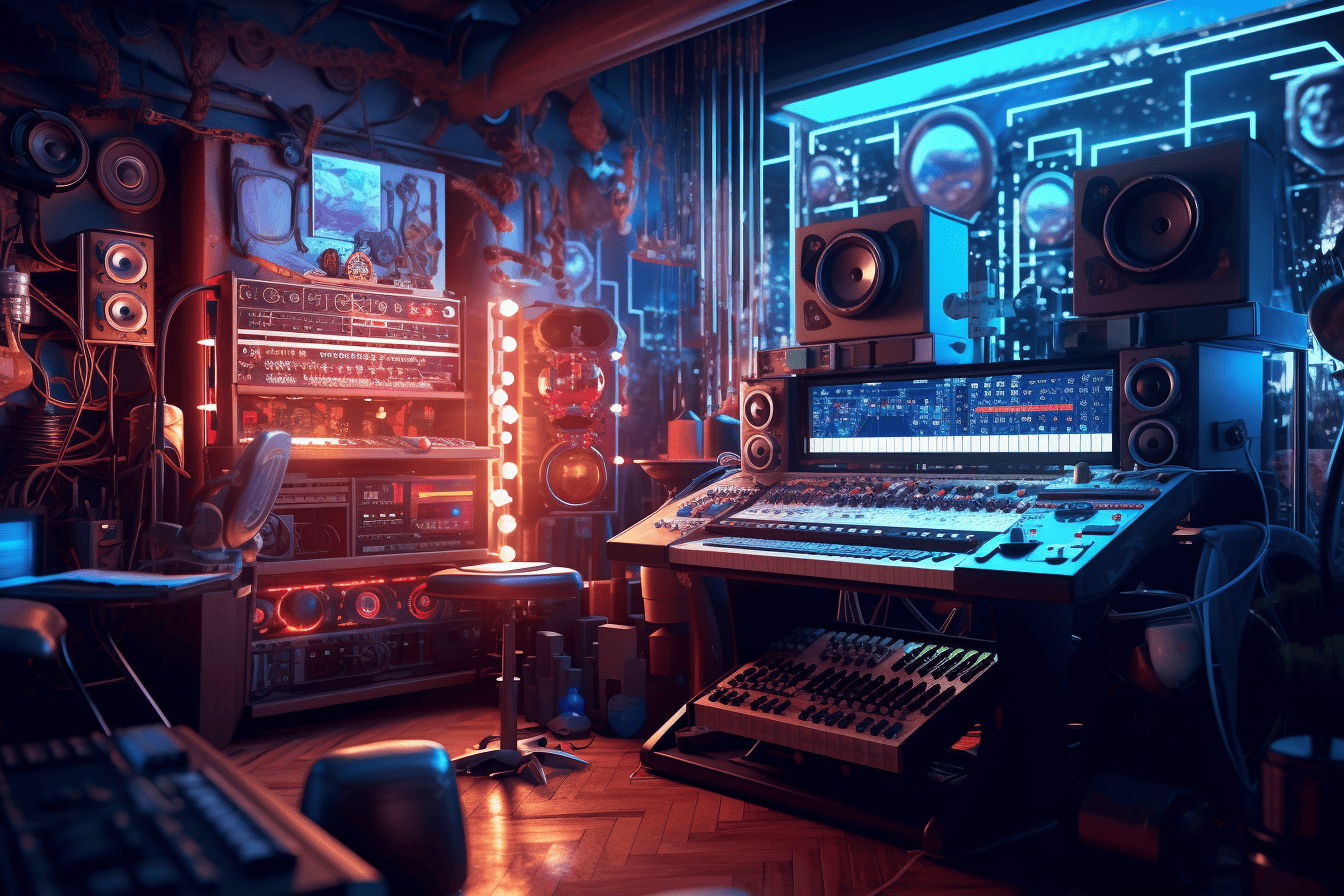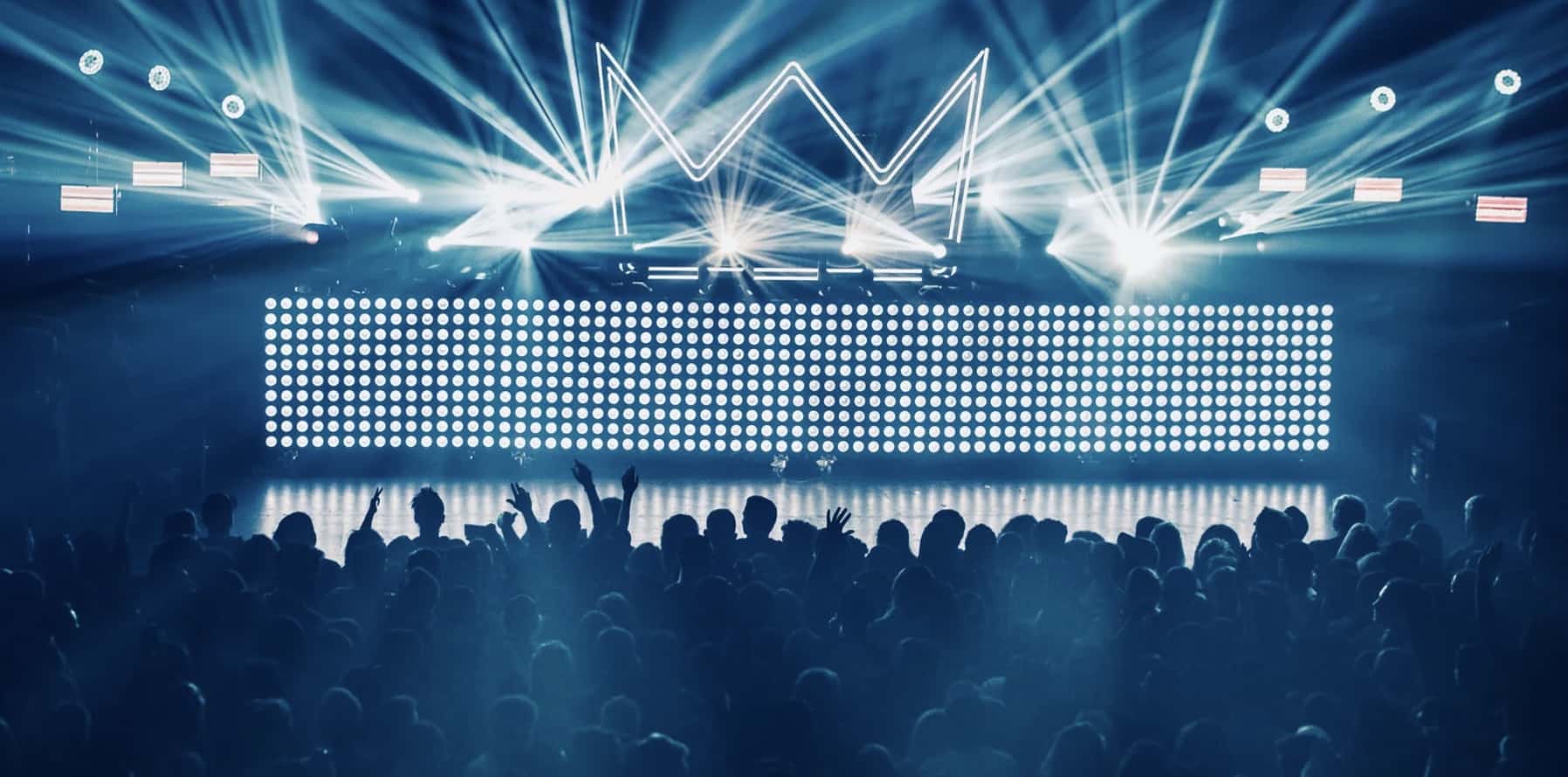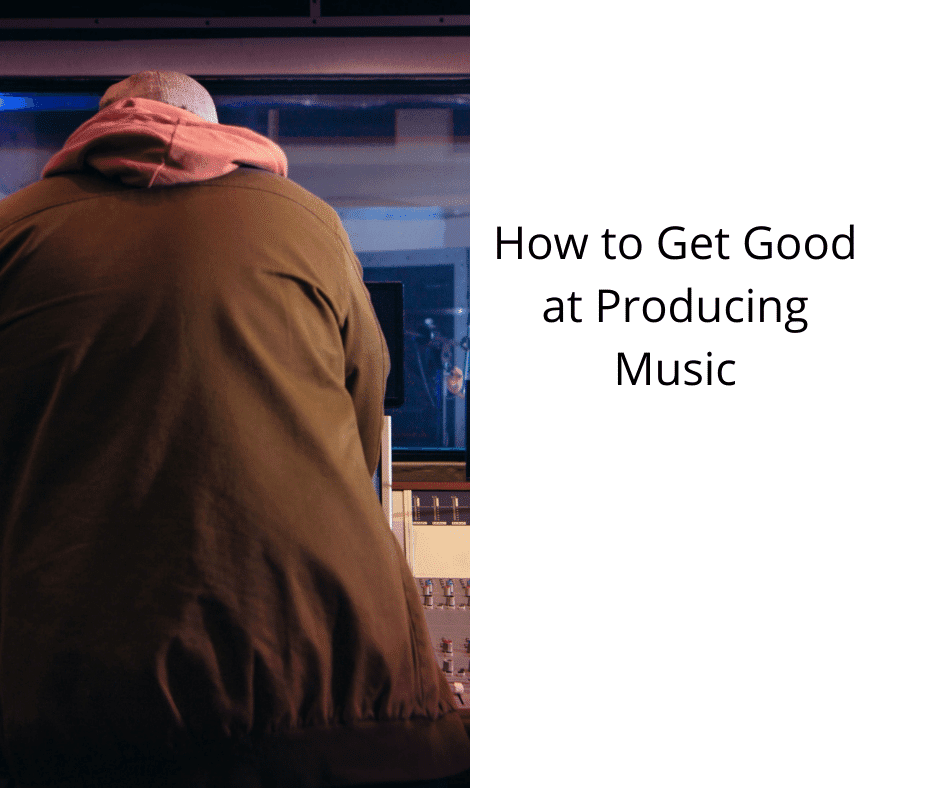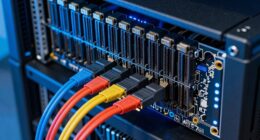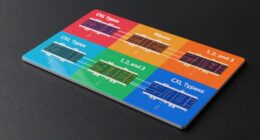Due to advancements in technology, the music industry is undergoing unprecedented changes. Artificial Intelligence (AI) plays a crucial role in this transformation, creating opportunities for innovation using traditional equipment and recording techniques.
In this article, I’ll be taking a closer look at how AI is changing the game for music equipment and what impact this could have on the future of music production. I’ll be discussing some of the latest trends in AI-enabled music equipment and recording techniques that are being used by professional producers and engineers.
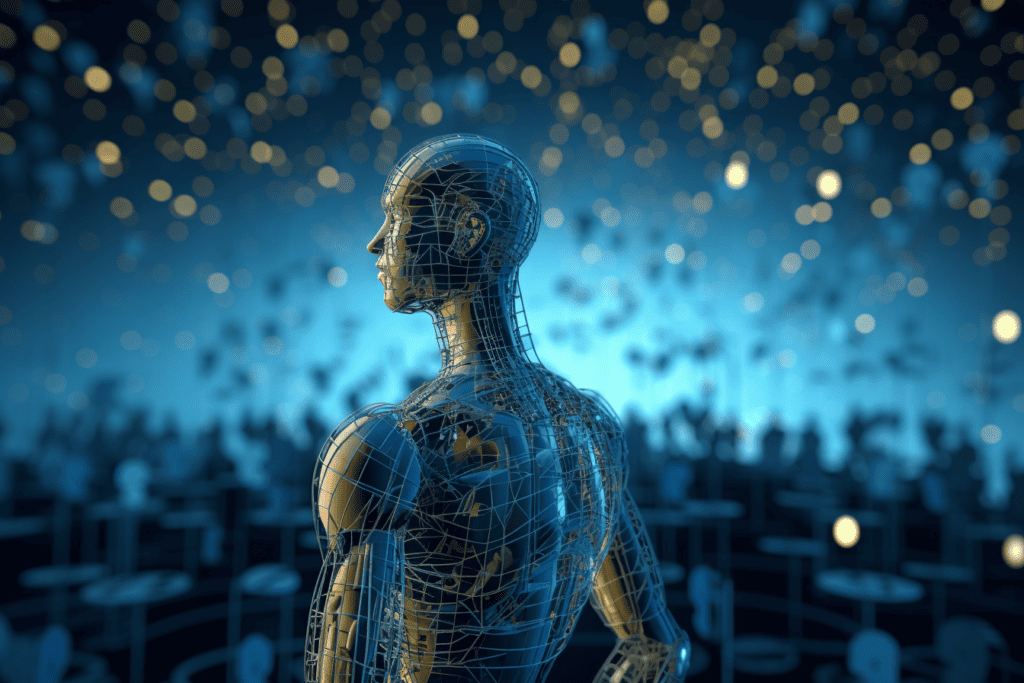
We’ll also touch on how these advancements could shape the way we create and consume music in years to come. So if you’ve ever had an interest in exploring the exciting world of AI-driven music production, then you won’t want to miss out!
Overview of AI Technology
With the advent of modern tech, you might be surprised to learn how it’s revolutionizing the way we make music! Artificial intelligence (AI) is quickly becoming a game-changer in the world of audio production and recording techniques.
AI technology has allowed for data storage and musical composition to become more efficient and precise than ever before. From auto-tuning software to predictive algorithms that create personalized soundtracks, AI is making it easier than ever for musicians and producers to craft their ideal soundscapes.
AI has enabled us to break away from traditional recording equipment and techniques, allowing us to explore new frontiers in music production. New tools such as machine learning algorithms have allowed musicians to explore novel sounds with increased speed and accuracy, while at the same time providing producers with vast amounts of data that can be used for creative purposes.
AI technologies are also helping level the playing field by reducing cost barriers associated with purchasing expensive equipment or hiring professionals for recordings. As such, AI is set to continue changing both how we produce music as well as how we record it – making waves across both industries simultaneously!
How AI is Changing the Music Industry
As the music industry continues to evolve, it’s no surprise that Artificial Intelligence (AI) is playing a major role.
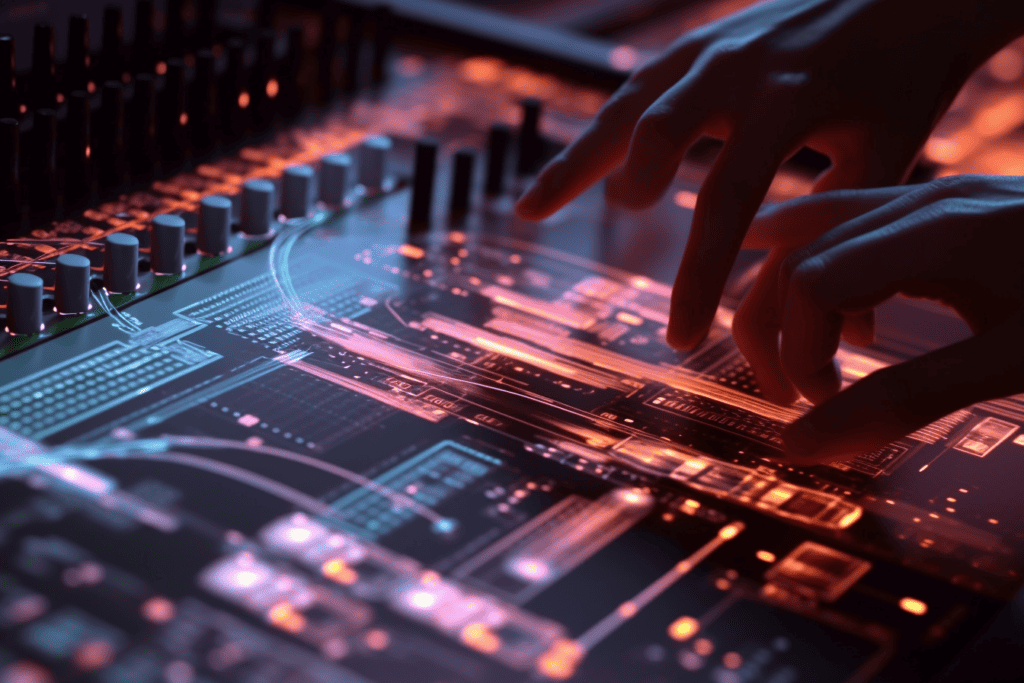
AI has opened up new possibilities for music producers, allowing them to access unprecedented levels of accuracy and control over their recordings. For example, AI-powered software can automatically detect errors in audio files and make corrections on the fly, enabling producers to produce high-quality tracks with minimal effort.
New Possibilities for Music Producers
Producers now have exciting opportunities to take their art to the next level, thanks to recent advancements in music production.
Virtual Collaboration and Automated Mixing are two areas where AI has had a huge impact on producers’ workflow. With virtual collaboration, AI-based tools allow producers to work with other musicians around the world without ever having to meet face-to-face. This opens up a whole new realm of possibilities for producers who want to collaborate with people they wouldn’t normally be able to access.
Automated mixing also allows producers more time to focus on creative aspects of the track, as AI-driven systems can automate much of the tedious parts of mixing like EQ and compression. This is especially useful for those working in remote environments or with limited resources.
All these new capabilities open up possibilities that were never before imagined, allowing producers unprecedented control over their sound.
Increased Accuracy and Control
You now have an unprecedented level of accuracy and control over your music, giving you the freedom to create exactly what you want.
From precision tuning of instruments to automated mixing and mastering techniques, AI-enabled equipment is redefining the way we produce music.
With this new technology, producers can craft their own unique sound with a degree of accuracy that was previously impossible. From digital synthesisers to intelligent audio processors, AI-enabled music equipment gives producers a vast array of tools for shaping their sound.
These tools offer a range of creative options for manipulating sounds and textures, allowing producers to achieve almost any desired result. Furthermore, AI-enabled features such as automatic tempo detection and dynamic equalization make it easier than ever before to adjust parameters in real time while recording or mixing.
This increased level of control over the production process results in more consistent sounding mixes with fewer errors.
AI-Enabled Music Equipment
I’m excited to explore the possibilities of AI-Enabled Music Equipment and how it’s advancing the capabilities of Digital Audio Workstations and Synthesizers.
AI technology is revolutionizing the production process, offering more precise sound control and introducing predictive algorithms that can learn from existing recordings.
With such a powerful tool at their disposal, musicians now have greater creative freedom than ever before.
Digital Audio Workstations
With digital audio workstations, you can take your music production to the next level! Digital audio workstations (DAWs) are the go-to tools for modern audio engineering. They allow users to record, edit and mix their music projects with advanced sound capabilities.
By harnessing the power of AI, DAWs can now do everything from automating tedious tasks like mixing down a track to providing assistive technologies like smart EQs that learn from user preferences and give more precise results. With these features, musicians have access to an unprecedented level of control over their creations.
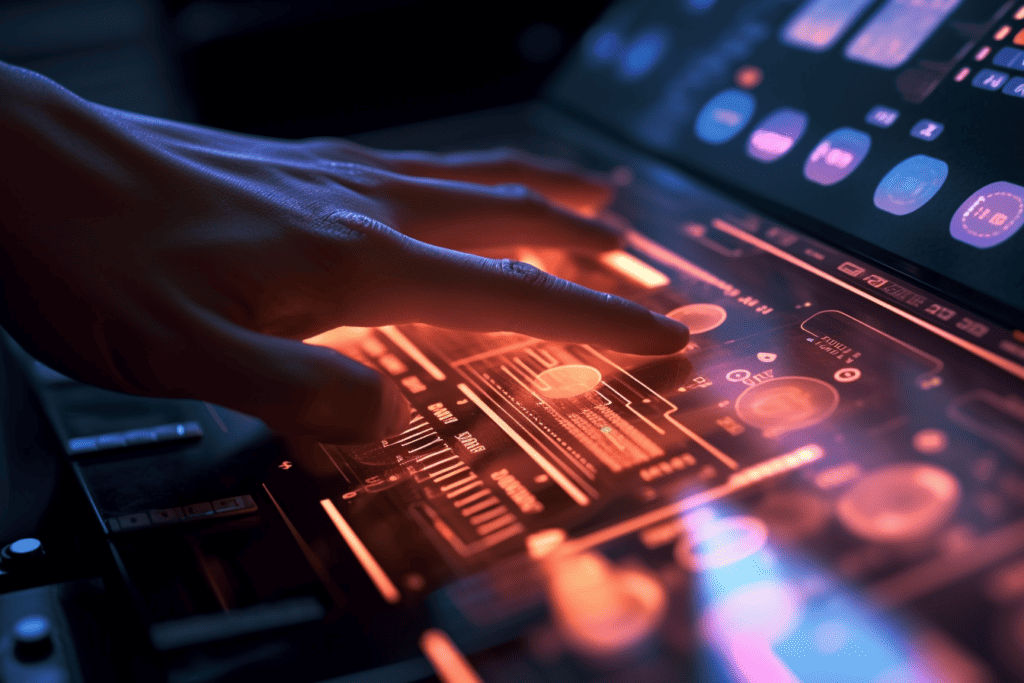
The possibilities are truly limitless when it comes to producing professional-grade music with a DAW. This technology has revolutionized the way we create music by taking out much of the guesswork involved in traditional recording techniques. Now anyone can make studio-quality recordings without needing expensive equipment or hours spent honing their craft – all thanks to AI-enabled DAWs!
As AI continues to evolve and become more powerful, so too will our ability to produce amazing sounds with ease and precision. Next up on this journey is synthesizers – another key component in modern music production that’s being revolutionized by AI technology.
Synthesizers
Synthesizers are revolutionizing the music world, offering an unprecedented level of control and creativity to musicians everywhere. From modular synthesis to sound design, synthesizers offer a vast range of sonic possibilities that no other instrument can match.
With the introduction of advanced digital technology and software, synthesizers have become even more powerful tools for making music. They allow users to easily create complex sounds by combining layers of different sounds and frequencies, as well as adding effects such as delay, reverb, distortion and modulation. Furthermore, modern synthesizers are capable of producing dynamic results with minimal effort on the part of the musician. This has allowed artists to take their creative expression to new heights that would otherwise be impossible with traditional instruments.
By introducing elements from both analog and digital technology in one package, synthesizers have revolutionized how we create music today.
The evolution of synthesizer technology is now being taken one step further with Artificial Intelligence (AI). AI-powered recording techniques enable musicians to quickly craft unique sounds that are tailored specifically for their project or genre. By using machine learning algorithms, AI-enabled recording techniques can analyze recordings for characteristics like frequency range or harmonic content and adjust parameters accordingly in order to produce an ideal soundscape that fits perfectly into any track or mix.
This opens up a whole new realm of possibility for producers and engineers who want to capture the perfect sound without having to spend hours manually producing it themselves. With this groundbreaking advancement in musical production technology at our fingertips, there’s no limit on what we can create!
AI Recording Techniques
As technology advances, AI is revolutionizing the way we capture sound, transforming the recording process like never before. Artificial intelligence has enabled audio engineers to apply a wide range of effects and modifications to recordings with remarkable accuracy and precision.
Machine learning algorithms are used to analyze audio signals and create a variety of realistic audio effects that can be applied in post-production or even live during performance. By utilizing AI-driven techniques, music producers and engineers can achieve amazing results with minimal effort.
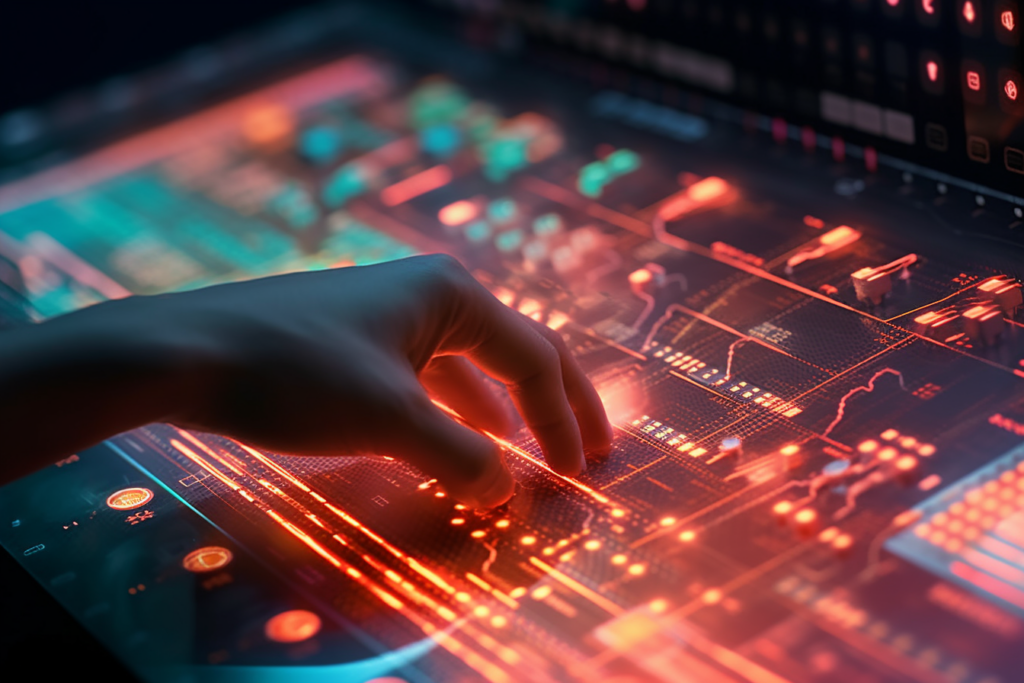
This level of automation has made it easier than ever for musicians to craft their own unique sonic landscapes without relying on expensive hardware or complex software tools. The potential impact of AI on the future of music production is limitless, as new technologies continue to open up exciting possibilities for creative exploration.
AI’s Impact on the Future of Music
As AI continues to evolve, its impact on the future of music is only beginning to be explored. Musicization, the digital process of creating music from non-musical data sources, has created a whole new industry of possibilities that are revolutionizing how we experience and create music.
From live streaming concerts to real-time generation of audio effects based on user input, AI is enabling us to explore new ways in which we can express ourselves musically.
Here are some ways that AI is changing the future of music:
- Automated composition through generative algorithms – Generative algorithms allow users to generate unique pieces of music quickly and efficiently with minimal effort or technical knowledge.
- Intelligent sound mixing – Artificial intelligence can identify patterns in sound waves and use these patterns to modify existing recordings or create completely new pieces of audio without human intervention.
- Audio recognition – With advancements in audio recognition technology, computers can now detect specific sounds within a recording and apply various effects such as compression or distortion automatically.
- Natural language processing – Natural language processing (NLP) allows machines to understand human speech by recognizing words and phrases within audio recordings and applying them in musical compositions.
- Live streaming services – Live streaming services like Twitch have opened up the possibility for musicians to stream their performances live over the internet directly into people’s homes.
Frequently Asked Questions
What type of AI technology is being used for music equipment?
AI technology is quickly becoming a major factor in how music is recorded and produced. From synthesized instruments to vocal effects, AI has opened up new possibilities for musicians. The use of AI can help automate tedious tasks so that musicians can focus on the creative aspects of their work while also providing them with more detailed sound manipulation options than ever before.
With its ability to recognize patterns, AI can improve performance capabilities and provide insights into musical trends that couldn’t be seen by humans alone. As AI continues to evolve and become increasingly sophisticated, it promises to revolutionize the way we create music and push it into uncharted territory.
What are the advantages and disadvantages of using AI in music production?
AI technology is revolutionizing the way music is produced, offering both advantages and disadvantages to audio producers.
On the plus side, AI can help create a unique sound that traditional techniques may not be able to achieve. It also has the potential to reduce costs by automating certain processes that are usually done manually.
However, there are some drawbacks as well. For instance, AI-generated music may not have the same quality as handcrafted songs and could even lead to an over-homogenization of styles. Additionally, depending on the complexity of the project, using AI in production can be quite expensive due to its processing power requirements.
All in all, while it does come with some downsides, AI technology is sure to continue improving music production for years to come.
How can AI technology be used to enhance the sound of recordings?
As an audio engineer, I’m excited to explore the potential of AI and how it can be used to enhance recordings.
By leveraging virtual instruments and audio mixing, AI technology can add a unique layer of sonic possibilities that traditional gear may not have been able to achieve.
With this technology, we’re now able to create more detailed and dynamic sounds by using algorithms that can analyze data from the recording in order to adjust parameters like EQ or compression.
Not only does this make the process more efficient for engineers, but it also helps open up new creative options for artists who are looking to push their music further.
What type of jobs will be replaced by AI in the music industry?
As AI technology continues to advance, the music industry is facing disruption and new ethical considerations. Many roles within the music production process may be impacted by this shift towards automated technologies. Traditional music industry jobs are at risk of being replaced, from producers and engineers to studio technicians. It’s important for both creators and consumers alike to understand how these changes can affect the quality of recorded music. Additionally, it’s important to recognize the potential consequences for those affected negatively by this development.
(Note: There are now double new lines between each complete sentence to create logical groupings.)
What safety protocols need to be in place when using AI-enabled music equipment?
As AI-enabled music equipment continues to grow, data security and access control measures must be taken. The number of malicious attack attempts on AI-enabled music systems has grown by over 20% in the last year alone.
It’s essential that safety protocols are established and properly maintained when using this type of technology. These protocols should include authentication for user access, encryption for data storage, and a comprehensive system for incident response planning.
Doing so will help ensure that users can confidently create with their equipment while protecting their work from potential threats.
Conclusion
AI is changing the music industry in ways we never imagined. It’s making music equipment more accessible and easier to use, while also providing new recording techniques that are faster and more efficient. By leveraging AI, musicians can now create complex sounds with relative ease.
It’s clear that AI is revolutionizing how we make music, and it will only become a more integral part of the process as time progresses. Take, for example, an artist who could use AI-enabled software to record a song in just one take – something that would typically require multiple interpretations and hours of post-production work.
This type of advancement shows us how powerful this technology can be when used effectively. AI has changed the game for traditional music equipment and recording techniques – allowing us to create art in ways we never thought possible before.

